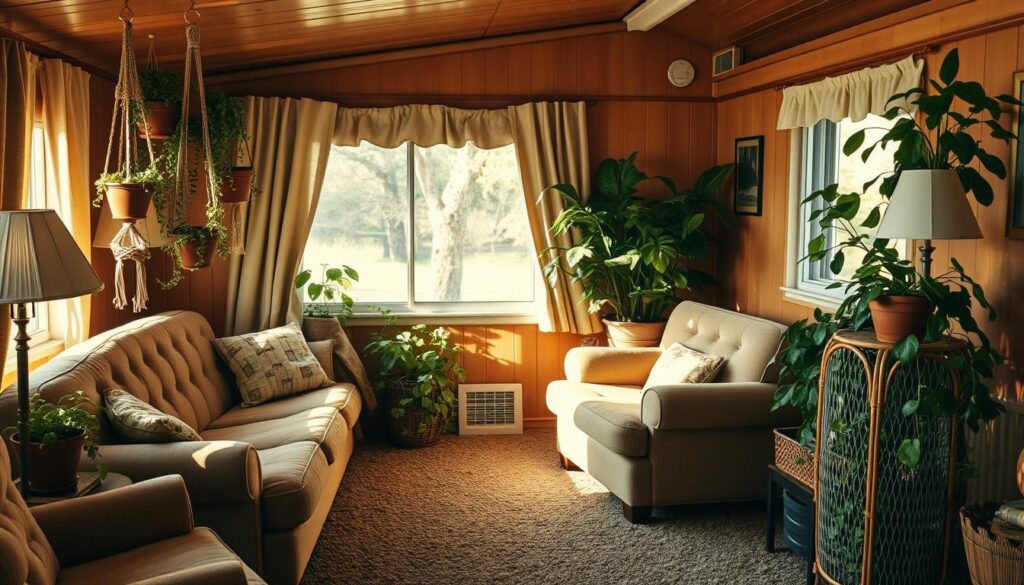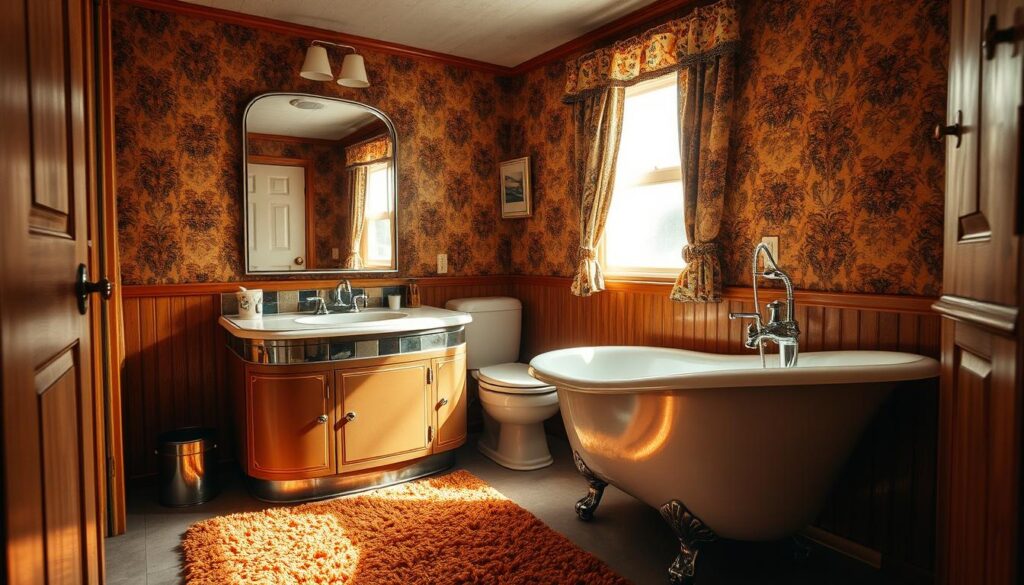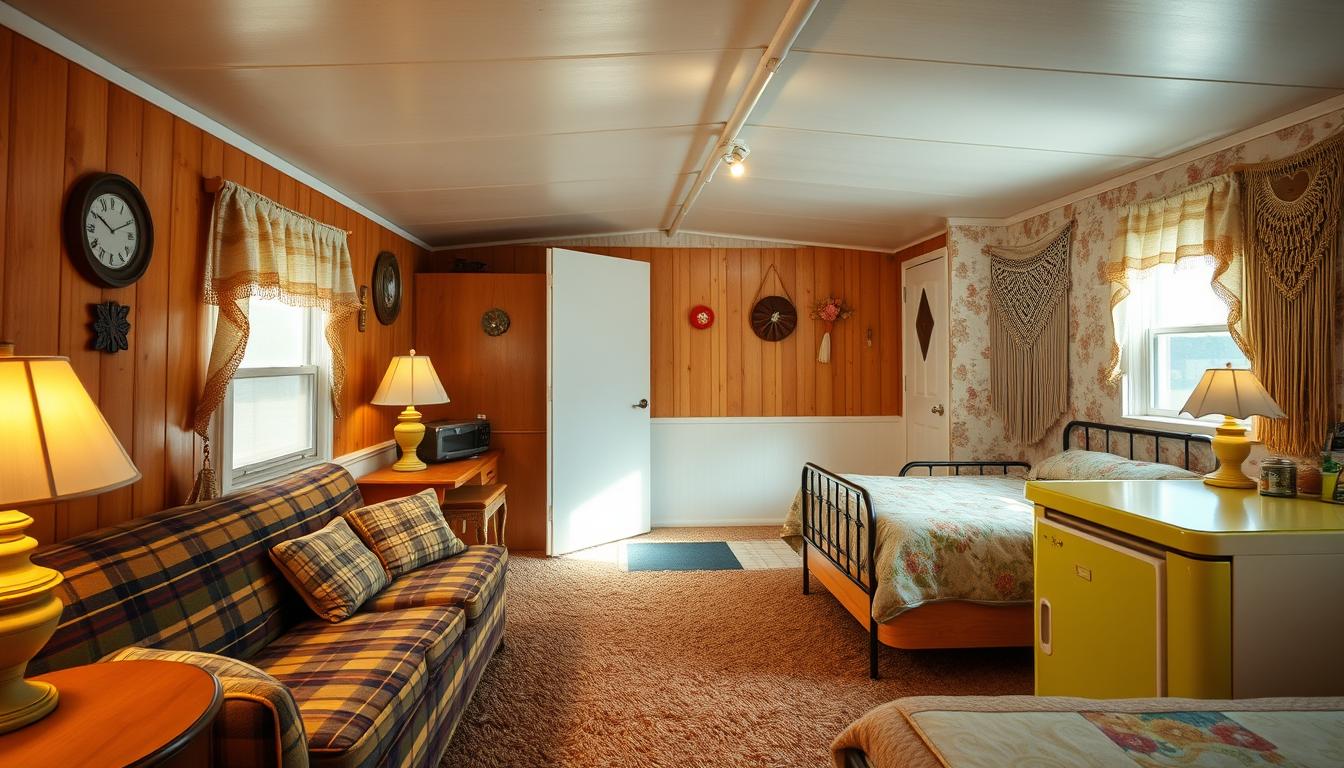The 1970s celebrated bold design and cozy living in single wide mobile homes. These homes showed off the era’s style and attitude. They often had retro kitchens and vintage decor that still bring a sense of nostalgia today.
Exploring 1970s single wide mobile home interior design, we see a unique look. Wood paneling, patterned wallpaper, and shag carpets defined the era. For those wanting to bring back this style, retro mobile home interior ideas offer a wealth of inspiration for nostalgic mobile home decor.
Key Takeaways
- Retro kitchens and vintage decor were hallmarks of 1970s mobile home design.
- Common design elements included wood paneling and shag carpets.
- Compact, functional spaces emphasized cozy living areas.
- Renovation ideas often involve modernizing kitchens and creating open living spaces.
- Nostalgic decor can be achieved with patterned wallpaper and decorative woodwork.
Embracing the Charm of 1970s Mobile Homes
Exploring 1970s mobile home interior design reveals a world of retro charm and elegance. This decade celebrated modernity and luxury, even in mobile homes. These homes were designed to be both comfortable and stylish, reflecting the era’s focus on contemporary design.
Single wide mobile homes were popular for their efficiency and affordability. They were designed to be compact yet functional, making the most of the available space.
Overview of Single Wide Mobile Homes
Single wide mobile homes were a staple of 1970s housing, offering a compact yet fully functional living space. These homes were typically characterized by their:
- Open floor plans, which maximized the use of space
- Efficient kitchen layouts, equipped with modern appliances for the time
- Cozy living areas, designed to be warm and inviting
Such features made single wide mobile homes an attractive option for many, providing a comfortable and modern living environment.
Popular Features of 1970s Designs
The 1970s mobile home designs were marked by several distinctive features, including:
- Smart Furnishings: Furniture was designed to be both functional and stylish, often featuring clean lines and minimal ornamentation.
- Complete Bathrooms: Bathrooms were fully equipped with tubs, showers, and modern fixtures, emphasizing comfort and hygiene.
- Contemporary Design: The overall aesthetic was contemporary, with an emphasis on modern materials and colors.
These features contributed to the unique charm of 1970s mobile homes, making them feel luxurious and modern for their time. When renovating a vintage mobile home, incorporating these elements can help maintain the authenticity and charm of the original design.
Key Elements of 1970s Interior Design
The 1970s celebrated bold expression in interior design. This trait is still loved in retro mobile home ideas today. The era had distinct design elements that created a unique look.
Retro color palettes were a big part of 1970s design. These palettes mixed earthy tones with bright, bold colors. Avocado green, harvest gold, and burnt orange were popular hues.
Retro Color Palettes
The 1970s used bold colors and natural materials. This mix created a warm and vibrant look. To use these colors in your mobile home, try these tips:
- Start with warm earth tones for walls and furniture for a cozy feel.
- Add bold colors with accessories like throw pillows, rugs, and curtains.
- Use natural materials like wood and wicker for depth and texture.
Here’s a look at some 1970s color palettes:
| Color Palette | Main Colors | Accent Colors |
|---|---|---|
| Earthy & Bold | Avocado Green, Burnt Orange | Harvest Gold, Cream |
| Retro Chic | Turquoise, White | Red, Black |
| Warm & Natural | Brown, Beige | Green, Gold |
Iconic Patterns and Textures
The 1970s loved bold patterns like paisley, florals, and geometric shapes. Textures were also key, with shag carpeting, vinyl, and Formica being favorites.
To add these elements to your mobile home, try these ideas:
- Use patterned rugs and textured throw pillows for interest.
- Choose vinyl or Formica for countertops and tabletops for the era’s look.
- Go for shag carpeting or thick area rugs for a cozy 1970s feel.
By using these retro colors and patterns, you can make your mobile home cozy and inviting. Whether you want to restore your home to its 1970s charm or just add some era touches, these elements will give you a retro look that’s both authentic and stylish.
Furniture Styles That Define the Era
The furniture of the 1970s is key in vintage mobile home design. This decade was all about bold and stylish furniture. These choices still shape interior design today.
Vintage Furniture Trends
The 1970s brought unique furniture trends. These trends are now iconic of the era. Some standout trends include:
- Lavish use of plush fabrics and rich textures in upholstery.
- The rise of retro-themed furniture, like bean bag chairs and conversation pits.
- A focus on functional yet stylish items, such as storage ottomans and modular sofas.
Must-Have Pieces for Authenticity
To get the 1970s vibe in a single-wide mobile home, add these essential furniture pieces:
- Waterfall tables: Known for their smooth designs, these tables were common in 1970s homes.
- Macramé wall hangings: These add a bohemian touch with their detailed patterns.
- Shag rug: A thick, plush shag rug brings the cozy, retro feel of the 1970s.
By using these vintage furniture trends and must-haves, homeowners can give their single wide trailer makeover a nostalgic yet modern look.
Flooring Options for a Retro Feel
Choosing the right flooring is key to a true 1970s mobile home look. The right flooring takes you back to the disco days and bell-bottom jeans. It brings a sense of nostalgia and authenticity.
Popular Flooring Materials
In the 1970s, mobile homes had unique flooring. Some top picks included:
- Carpeting: Shag or boucle styles were common, adding warmth and texture.
- Linoleum: Durable and easy to clean, it featured bold patterns.
- Sheet Vinyl: Versatile and water-resistant, perfect for kitchens and bathrooms.
David A. Johnson, a renowned interior designer, said, “The flooring you choose can change a room’s feel, making it retro or modern.”1
“The right flooring can make a room feel like a time capsule, encapsulating the style and spirit of the era.”
| Material | Characteristics | Best Use |
|---|---|---|
| Carpeting | Warmth, texture, variety of patterns | Bedrooms, living rooms |
| Linoleum | Durable, easy to clean, bold patterns | Kitchens, hallways |
| Sheet Vinyl | Water-resistant, versatile, easy maintenance | Bathrooms, kitchens |
Maintenance Tips for Longevity
To keep your retro flooring looking great, regular care is essential. Here are some tips:
- Regularly vacuum or sweep carpeted areas to prevent dirt buildup.
- For linoleum and sheet vinyl, use a gentle cleaner and avoid abrasive scrubbers.
- Consider applying a protective coating to your flooring to enhance durability.
By following these tips, you can enjoy your retro flooring for years. It will keep your 1970s mobile home looking authentic.
The Importance of Lighting in 1970s Homes
Lighting was key in 1970s mobile homes. It helped create the era’s unique feel. Lighting fixtures did more than just light up the space. They added to the retro look that defines these homes.
Types of Lighting Fixtures
The 1970s had many lighting fixtures that became symbols of the time. Globe lights, lava lamps, and sputnik chandeliers were favorites. These lights were not just for light; they were also decorative, showing off the era’s style.
Ambient vs. Task Lighting
In 1970s homes, lighting had two roles. Ambient lighting made the space feel cozy and inviting. Task lighting, on the other hand, was for specific tasks, like cooking or reading.
Getting the right mix of these lights was important. It helped make spaces both useful and stylish, fitting the retro vibe of the time.
Bringing the Outdoors In
The 1970s mobile home culture was all about mixing indoors and outdoors. As we try to bring back that nostalgic feel, it’s key to include outdoor elements inside.
Designing with Plants
Using plants is a simple way to bring the outdoors into your single-wide mobile home. Plants clean the air, look great, and connect us to nature. Try hanging plants, potted plants, and a small herb garden on a sunny windowsill for a lush feel.
Choose plants that do well indoors and need little care. Spider plants, snake plants, and peace lilies are good choices. They’re tough and add a retro charm to your decor.

Creating Cozy Outdoor Spaces
In the 1970s, outdoor spaces were an important part of mobile home living. To make your outdoor area cozy, think about how to improve it.
Start with comfy seating and the right lighting. A patio set is great for morning coffee or evening chill-out time. Outdoor decor like wind chimes, lanterns, or a fountain can make your space feel like an extension of your home.
By focusing on both indoor and outdoor design, you can create a smooth transition between your spaces. This makes your home feel more connected to nature.
Kitchen Features from the 1970s Era
Step into a 1970s mobile home kitchen, and you’ll see the era’s unique style. It’s all about innovative appliances and retro looks. These kitchens were the heart of the home, full of modern appliances and bold designs.
The 1970s saw kitchens get more modern, making cooking easier. You’d find built-in ranges and ovens everywhere. They looked sleek and saved space in mobile home kitchens.
Essential Appliances of the Time
1970s kitchens were all about style and function. Twin sinks made cleaning up easier. These appliances were both useful and stylish, adding to the kitchen’s look with their sleek designs and metallic finishes.
- Built-in range and oven
- Twin sinks
- Refrigerators with distinctive designs
Colorful Cabinets and Countertops
The 1970s were all about bold colors, and kitchens were no exception. Cabinets and countertops often had Formica counters in bright colors and patterns. Avocado Green and Harvest Gold were big hits, giving kitchens a unique retro vibe.
To bring back this look in a modern mobile home, think about using vintage-style appliances and fixtures. Adding colorful cabinets and retro-patterned countertops can also help achieve that 1970s kitchen feel.
Refreshing the Bathroom from a Nostalgic Lens
Updating your bathroom with a nostalgic vibe can change how your retro mobile home feels. The 1970s were famous for bathrooms with both tubs and showers. We can update this with modern touches while keeping the old charm.
Vintage Bathroom Fixtures
To bring back the 1970s bathroom look, think about using vintage fixtures. Brass or chrome faucets and retro-style shower heads can add a nostalgic feel. Look for items that show off the era’s love for bold shapes and shiny finishes.
Choosing vintage bathroom fixtures means finding a balance. We can mix real vintage pieces with modern ones. This way, we get both the look and the function we need today.

Creative Storage Solutions
Good storage is key in any bathroom, and 1970s mobile homes are no different. To keep the retro look while adding function, try creative storage solutions. Think about vintage-style cabinets, baskets, or shelves that fit the era’s style.
- Use over-the-toilet storage for more shelves.
- Get a vintage-inspired medicine cabinet for easy access to essentials.
- Choose a retro-style vanity that has lots of storage and still looks old-fashioned.
By adding these touches, we can make the bathroom in our retro mobile home fresh. We blend the charm of the 1970s with today’s conveniences.
Accessorizing Your 1970s Mobile Home
The secret to a charming 1970s single wide mobile home interior is in the details. Decor and personal touches are key. Accessorizing lets you show your personality while keeping the nostalgic vibe.
Decorating a 1970s mobile home is all about the iconic items. Think vintage drapes, shag carpeting, and retro lamps. These elements bring the era to life.
Iconic Decor Items
To capture the 1970s feel, focus on iconic decor. Some essentials include:
- Vintage posters and prints
- Macramé wall hangings and plant holders
- Retro-colored appliances and fixtures
- Shag rugs and vintage carpeting
These items add a nostalgic charm and tie your home’s look together.
Tips for Personalizing Your Space
While keeping the nostalgic vibe, add personal touches. Here’s how:
- Mix and Match: Blend vintage finds with modern pieces for a unique look.
- Add Plants: Plants were big in the 1970s and still bring warmth today.
- Display Personal Items: Show off your favorite memories and mementos.
By mixing nostalgic decor with personal touches, you make your space uniquely yours.
Modern Takes on 1970s Mobile Home Interiors
Updating a 1970s single wide mobile home is a fun and creative project. We can draw inspiration from the original design. Then, we can add modern elements to create a unique and functional living space. For those looking for 1970s trailer remodel inspiration, blending vintage charm with contemporary style is a great approach.
Blending Vintage with Contemporary Style
To achieve a harmonious blend, we can mix retro color palettes and iconic patterns with modern furniture and decor. This balance creates a space that feels both nostalgic and current. When considering mobile home renovation tips, it’s essential to preserve the original character while updating the functionality.
Preservation vs. Renovation: Finding the Balance
Renovating a 1970s mobile home requires careful consideration. We need to decide what elements to preserve and what to update. We can retain the nostalgic feel of the original design while adding modern amenities and comforts. By striking the right balance, we can create a space that is both authentic and livable.


